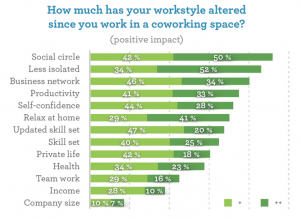What is coworking?
Here is Brad Neuberg’s original conception (this blog post represents the first public expression of the term as it is used today), which we think captures the spirit as well as any other definitions out there:
Traditionally, society forces us to choose between working at home for ourselves or working at an office for a company. If we work at a traditional 9 to 5 company job, we get community and structure, but lose freedom and the ability to control our own lives. If we work for ourselves at home, we gain independence but suffer loneliness and bad habits from not being surrounded by a work community.
Coworking is a solution to this problem. In coworking, independent writers, programmers, and creators come together in community a few days a week. Coworking provides the “office” of a traditional corporate job, but in a very unique way.
Here’s one of our favorite definitions, from Coworking.com, managed by a team of coworking space managers and owners who have been central to the coworking movement from its early days:
The idea is simple: that independent professionals and those with workplace flexibility work better together than they do alone. Coworking answers the question that so many face when working from home: “Why isn’t this as fun as I thought it would be?”
Beyond just creating better places to work, coworking spaces are built around the idea of community-building and sustainability. Coworking spaces uphold the values set forth by those who developed the concept in the first place: collaboration, community, sustainability, openness, and accessibility.
How was coworking born?
Why join a coworking space?
 Coworking spaces offer dynamic locations of exchange and sharing. Freelancers, entrepreneurs, and creatives from diverse fields enlarge your network, but more importantly serve as a resource of experience and knowledge and potential collaboration or inspiration. For many members, however, the most important benefit is purely the positive social energy. Members often feel more motivated surrounded by other focused, hard-working members.
Coworking spaces offer dynamic locations of exchange and sharing. Freelancers, entrepreneurs, and creatives from diverse fields enlarge your network, but more importantly serve as a resource of experience and knowledge and potential collaboration or inspiration. For many members, however, the most important benefit is purely the positive social energy. Members often feel more motivated surrounded by other focused, hard-working members. One of the biggest benefits is improved work-life balance. Location-independent professionals often work from home or from cafes and face one of two common challenges. Either they spend too much time alone and miss the social proximity and social connections they used to have before they were independent OR they have a partner or children at home and have difficulty explaining to their partner or kids that they really do need to work even though it’s true that they set their own schedule.
Most coworking spaces also organize events that help facilitate both the social relationships, motivation, and professional development. Locus, for example, organizes weekly coffee breaks and lunches, and monthly pub nights and game nights to facilitate meaningful social connections. For motivation, Locus hosts weekly Work Jams, where members sit together at the same table and use a timer to work together for a half day with planned breaks, and weekly critique-free writing meetups to help provide a sacred time and place, and positive social energy, for focused writing.
Coworking spaces promote sustainability as key players in the sharing economy. They allow members to dramatically reduce commute times because they are often located in the neighborhoods where their members work, and they reduce operation costs and startup time by providing great office infrastructure to members who could never justify having meeting rooms, data projectors and other high-quality office equipment in central locations if that space was not shared among many other location-independent professionals.
Many coworking spaces also serve as a kind of landing zone, helping to connect global and local. About 70% of Locus’s members, for example, come from countries other than the Czech Republic (nearly 30 different countries), with the language of the space being English. This allows newcomers to Prague a ready way to form a community with other people like them, and also with English-speaking Czechs who are welcoming to an international community and reading to share local knowledge. Czech members, who make up about 30% of Locus’s members, get the complementary benefit of ready access to a friendly international community and a workplace where they can practice their English on a daily basis.
━━━━━━━━━━━━━━━━━━━━━━━━━━━━━━━━━━━━━
Some statistics about the impacts of coworking
- 74% of coworkers are more productive,
- 86% have a larger business network,
- 93% have a bigger social network,
- Over two-thirds feel more creative and collaborate more on projects
- A third reported an increase in income.
━━━━━━━━━━━━━━━━━━━━━━━━━━━━━━━━━━━━━
Still not convinced?
Sources
http://codinginparadise.org/weblog/2005/08/coworking-community-for-developers-who.html
https://en.wikipedia.org/wiki/Coworking


